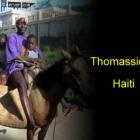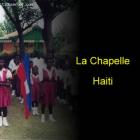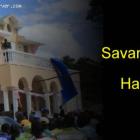ADVERTISEMENT
usaid - Haiti Observer Blog
USAID, Haiti Observer Blog. Read the following articles about USAID
USAID Bought 2011 Election for Martelly
In the 2010 general election the U.S. Agency for International Development (USAID) covertly funded Michel Martelly's presidential bid. The money came when it looked as if Martelly might not get on the second ballot.
A dozen presidential candidates on voting day claimed ". . . the elections were a fraudulent mess . . .", and said the only way to guarantee a fair outcome was to begin the voting process again. Martelly supporters protested in the streets, claiming electoral fraud and predicting victory for Martelly.
The U.N. Peacekeeping Mission's, Edmond Mulet, assured Martelly, among other candidates, they would be on the second ballot, and to stop asking for the election to be cancelled. However days later when Martelly didn't make the second ballot, his supporters protested in the streets again.
USAID funded political movement backing Martelly in 2010
It seems like the U.S. Agency for International Development was not just an observer in the 2010 Haiti election but rather a major player. According to Al Jazeera, the agency gave close to $100,000 to a Haitian political movement Tét Kale (MTK) which has close ties to President Michel Martelly during the 2010 elections.
Al Jazeera reported that documents obtained through Freedom of Information Act reveal that the U.S. government provided close to $100,000 as support to MTK, through USAID. US law allows USAID to provide support to political groups without discrimination. This funding can not be used to influence election outcomes.
Haiti did not meet 2014 minimum USAID funding requirements transparency
Haiti found itself among the the 50 countries that receives USAID funding for 2014 but did not meet the minimum requirements set by The State Department and USAID. Don't worry, just like the other countries, Haiti is considered to be at risk of political devastation and strategic consequences if the funding is stopped and as a consequence will continue to receive aid as usual.
Kreyol Pale, Kreyol Kompran!
Gouvernman Amerikin bay 50 payi lajan kom aid, min li pa kapab di tout sa payi sa yo fè ak lajan sa. Ayiti se yonn nan payi sa yo. Min pou ki sa Amerikin pa koupe aid sa yo, se paske li panse si aid sa yo koupe, ka payi sa yo ape pi tris
U.S. aid and trade policies characterized as disastrous to Haiti
Many people might view the established custom of the United States to provide food aid to Haiti as a beneficent act to a struggling country; a selfless act that operates at a loss to the American taxpayer. But the truth is U.S. aid and trade policies may well do more for American farmers than for the average Haitian. In fact, U.S. aid, as Haiti has been experiencing it for the past few years, has done the country, its agricultural sector and its citizens, more harm than good.
Somewhere between 50% and 60% of the population of Haiti rely on their own small farms for subsistence. The practices and policies attached to U.S. Aid food operate in such a way that the livelihoods of farmers and subsequently the Haitian Agricultural Sector are negatively affected. Today, Haiti imports no less than 50% of the food it consumes, making itself America's second largest importer of rice. This problem was detailed in a study done in 2006 that showed that nearly 100,000 people were negatively impacted by the lowering of Haitian chicken, rice and sugar tariffs.
Haiti to build Qatar City, with housing, vocational school
The government of Qatar seeks to honor the pledge it made to a devastated Haiti in the wake of the earthquake tragedy of January 12, 2010. Then $20 million was promised to help fund Haiti's reconstruction, and today, $5 million of that sum is intended for the creation of Qatar City.
Planned to be an income generating micro-economy for earthquake victims, Qatar City will feature a commercial area and vocational school around which 148 homes will be built as permanent places of residence.
The project, a joint effort between the Qatar Haiti Fund (QHF) and the US Agency for International Development (USAID) was recently given the green light and sees USAID meeting QHF's donation, which is designated for the construction of the school, houses and commercial area, with a $4 million dollar contribution that will fund the management services and site operation of the construction. The 35 square meter houses will have two rooms and will be built to the current standards for earthquake and hurricane resistance.
US Program Failed To Award Loans to Intended Targets in Haiti
U.S. Agency for International Department (USAID) started a program that aimed towards boosting up the economy of Haiti through targeted loans to Haitian business units. It has been found in an audit that program failed as the intended targets did not receive the loans, workers were not trained properly and there was no systematic record maintenance. The Office of Inspector General of USAID released the audit report towards the end of February. The aim of this audit was to find out whether areas like waste management, handicrafts, tourism, construction and agriculture were benefited through the promotion of lending practices.
Mobile Money in Haiti by Bill & Melinda Gates Foundation, a Success
Haiti's aim for socio-economic development has paved way for both local and international bodies and institutions to cooperate in providing the country and its people different means to attain this. Through technology, these entities have found various innovative ways to assist most especially the poor sector of Haitian society. The Mobile Money initiative, which was launched in the country last 2010 by Bill & Melinda Gates Foundation and the United States Agency for International Development (USAID), continues to offer promising results.
The Haiti Mobile Money Initiative organized by the Gates Foundation has recently reached a five-million worth of transactions. This resulted in Digicel and Voila, two of the country's mobile network companies, sharing an award worth 3.2 million dollars for this milestone, which marks the final award of the initiative's ten-million-dollar incentive fund. The growing success of mobile money assists Haitians with a more practical and easier way through their mobile phones in taking care of monetary transactions as ninety percent of them do not have bank accounts. Aside from the HMMI, the government has launched two projects involving mobile money called "Aba Grangou" and "Ti Manman Cheri". The "Ti Manman Cheri", otherwise known as "Dear Little Mother", aims to help Haitian youth that are facing extreme poverty.
Our objective is to share with you news and information about Haiti and the people of Haiti. Traditions, habits and the way we were or grew are alive in this site. We highly recommend that you Subscribe to our Newsletter and also share with us some of the things that are memorable and made us unique people.

 Thomassique, Haiti
Thomassique, Haiti  La Chapelle, Haiti
La Chapelle, Haiti  Haiti tech Summit
Haiti tech Summit  The Town of Savanette, Haiti
The Town of Savanette, Haiti  Something to think about
Something to think about